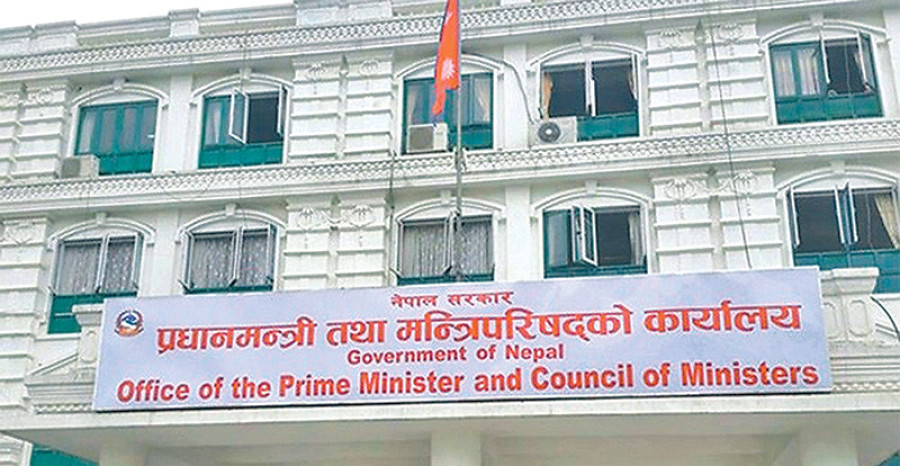National
Government’s bid to vest power to deploy army in prime minister draws flak
The recent government move to further empower the prime minister through legal means has drawn flak from various quarters of society and political parties.
Tika R Pradhan
The recent government move to further empower the prime minister through legal means has drawn flak from various quarters of society and political parties.
The Bill on Work, Responsibility and Rights of National Security Council, registered at Parliament on Wednesday, has included a provision vesting the power to recommend deployment of the Army in the prime minister without even holding a council meeting.
The council headed by prime minister, according to the constitution, has ministers for defence, home, foreign and finance as well as chief secretary and chief of the Army as members.
Clause 6 (3) in the bill states that irrespective of what is mentioned in the Sub-clause 2, the chairman [of the security council] can recommend the government deployment of the Army if there is a serious national crisis—or such crisis could happen if the Army is not deployed—in the event a meeting of the National Security Council is not possible.
However, Sub-clause 2 of the bill has included the provision stated in Article 267 of the constitution that the President will declare the mobilisation of the Army as per the Cabinet decision on the council's recommendation.
Article 267 (6) states that: “The President shall, on recommendation of the National Security Council and pursuant to a decision of the government of Nepal, Council of Ministers, declare the mobilisation of the Nepal Army in cases where a grave emergency arises in regard to the sovereignty or territorial integrity of Nepal or the security of any part thereof, by war, external aggression, armed rebellion or extreme economic disarray. A declaration of the mobilisation of the Army must be ratified by the House of Representatives within one month after the date of such declaration.”
The main opposition Nepali Congress, has already expressed its reservations about the provision, saying that the move is against the spirit of the constitution.
Sanjay Gautam, a Congress lawmaker and former minister, registered a “protest notice” against the bill on Friday. Such a notice is registered before a bill is tabled in Parliament, demanding that the bill not be tabled. The Parliamentary Party of the Nepali Congress has also called a special meeting on Sunday to discuss what it calls a “controversial bill”.
“I will discuss with security experts and present my views during Sunday’s Parliamentary Party meeting,” Gautam said, adding that the bill was very serious and that indicates the prime minister is heading towards authoritarianism.
Since assuming office in February last year, Prime Minister KP Sharma Oli has brought scores of government agencies under the Prime Minister’s Office, which many say will not only allow him to have his way in decision-making but also pose a threat to checks and balances.
On February 23, the government brought the National Investigation Department (NID), the Department of Revenue Investigation (DRI) and the Department of Money Laundering Investigation (DMLI) under the PMO by amending the Nepal Government Business Rules. That meant, the PMO would have more say in issues of foreign policy, national security and financial and economic crimes.
Unlike in the past when the PMO took updates and monitored the issues, the new business rules mean the office not only receives information and coordinates on political, economic, social, administrative, diplomatic and national security matters but also intervenes whenever necessary.
Pashupati Shumsher Rana, chairman of the Rastriya Prajatantra Party (United), has objected to the move saying the government is in a bid to establish a "communist democracy".
“Preparations to allow prime minister to deploy army without National Security Council’s decision is objectionable,” Rana said while addressing party’s function at Taulihawa of Kapilvastu on Saturday. “We won’t accept Oli’s communist democracy.”
Security experts said rather than making the prime minister solely responsible for operations of security forces, including the Army, it would be rather better to take all the stakeholders into confidence while dealing with a sensitive issue like security.
“It not only helps in dealing with security related issues, but also makes the operation smooth and effective if all the stakeholders are included and taken into confidence before taking a decision,” Binoj Basnyat, a retired Nepali Army major general, told the Post. “With political unity in place, it would be easier for the security forces to operate.”
Of late, Oli has met with criticism from his own party leaders for making unilateral decisions and centralising power.
Some of recent crucial decisions, party leaders told the Post, were taken straight from Baluwatar without even discussing with some senior leaders.




 9.7°C Kathmandu
9.7°C Kathmandu














